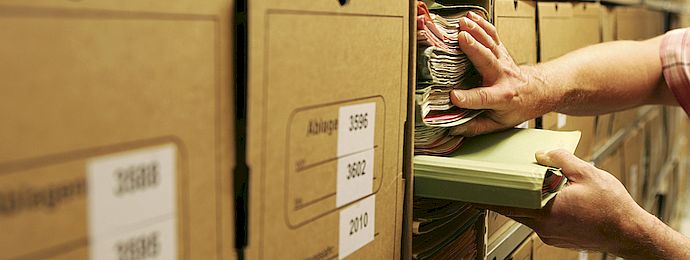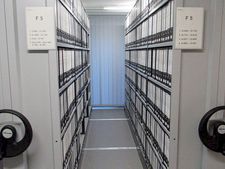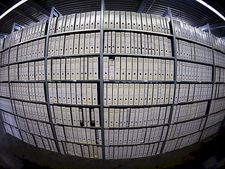-
BASE
subnavigation
BASE
- About us
- Laboratorium
- Career
- Laws and regulations
- Legal Basis
- Manual on Reactor Safety and Radiation Protection
- 1A Nuclear and radiation protection law
- 1B Other laws
- 1C Transport law
- 1D Bilateral agreements
- 1E Multilateral agreements
- 1F EU law
- 2 General administrative provisions
- 3 Announcements of the BMU and the formerly competent BMI
- 4 Relevant provisions and recommendations
- 5 Nuclear Safety Standards Commission (KTA)
- 6 Key committees
- Annex to the NS Handbook
- A 1 English translations of laws and regulations
- Dose coefficients to calculate radiation exposure
- BASE topics in the Bundestag
-
Topics
subnavigation
Topics
Nuclear Safety
Interim Storage / Transport
-
News
subnavigation
Collecting and preserving documents

![]() Source: picture alliance / imageBROKER | Jochen Tack
Source: picture alliance / imageBROKER | Jochen Tack
The repository should protect people and the environment from radioactive substances for a million years.
In accordance with its legal mandate, BASE collects information about the repository and the materials in storage that is relevant in terms of society and safety. The information is stored in both analogue and digital form. This secure, processed information should be available beyond the time of repository closure and for at least 500 years thereafter. BASE therefore faces the following challenge: it must preserve an institutional awareness of the importance of the systematically compiled documents over such periods of time. In doing so, it will gradually become the "memory of nuclear waste disposal" in Germany.

![]() Collections in the archive
Source: BASE
Collections in the archive
Source: BASE
BASE will probably operate archives at two separate locations in Germany. This will ensure that at least one copy or a second complete data set would remain even if one archive were to be lost.
Extensive data and documentation
The scope of the data and documents to be archived is initially set to be extensive. Nuclear waste management organisations submit data and documents to BASE, including those on
• the history of the Gorleben site
• the immediate history of the site selection procedure
• the deliberations of the Final Repository Commission,
• interim storage,
• all the stages of the site selection procedure, including public participation,
• the construction, operation and decommissioning of the repository and
• the stored waste.
From the first steps towards a repository to the measures following its closure, a large number of documents will be created. These must first be obtained in full. Data and documents will then be selected for long-term storage from this quantity.
An international group of experts developed recommendations for the creation of specific information repositories in 2019:
the Key Information File (KIF)
The KIF summarises basic information, known as "key information", in a relatively concise single document in generally understandable language. It primarily serves to maintain knowledge about the repository site and is aimed at the entire population.
the Set of Essential Records (SER)
The SER, i.e. the "set of essential records", summarises important data and specialist documents on a much larger scale. They are primarily used to understand the safety of the repository and to assess potential dangers.
Retain analogue inventoriesshow / hide

![]() Source: picture alliance/dpa | Swen Pförtner
Source: picture alliance/dpa | Swen Pförtner
The analogue records to be stored at BASE comprise all physical information carriers. This includes paper files as well as photographs and large-format plans.
Until the 1990s, information was mainly recorded, used and stored on paper. Yet, today, we see the use of inferior components in past paper production accelerating its decay. Therefore, conservation measures are taken and special storage conditions created before paper documents are stored permanently.
These measures and conditions include
- maintaining and monitoring favourable climatic conditions for analogue media such as sheets of paper or photographs
- the use of certified protective packaging for paper-based documents such as files, plans and folders
- an integrated pest control programme
- risk and emergency planning to protect against external influences
In this context, BASE commissioned a research project on the long-term durability of paper (Labest paper). The aim was to determine a durable writing and printing material based on various types of paper and ink.
Preserving digital recordsshow / hide

![]() Source: picture alliance/keystone| Christian Beutler
Source: picture alliance/keystone| Christian Beutler
Nowadays, data and documents are almost exclusively created in digital form, and the only effective way to use the majority of them is digitally, too. Computer simulations or virtual 3D models, for example, cannot really be processed on paper. The initial volume of data and documents is also too large to be used efficiently in analogue form. For these reasons, BASE is setting up a digital archive and is taking on so-called digital long-term archiving.
In this context, "long-term" does not refer to a precisely defined period of time, but rather to periods of time in which technical and social changes may hinder the usability of the information. "Archiving" digital information means not only storing it on data carriers, but also addressing a range of challenges for the usability of digital data, such as:
- Compared to analogue data carriers (such as paper), typical digital storage media are more error-prone, have more prerequisites (e.g. readers needed) and become obsolete more quickly.
- The software for utilising the data is evolving. Older data cannot always be used problem-free with the available software environment.
- Thus, the digital infrastructure of a long-term archive is complex, too, and must be updated regularly.
Various measures are necessary to meet these challenges:
- Data loss can be caused by local disasters such as fires. To prevent this, multiple copies of the data should be stored independently at different geographical locations.
- The application of proven methods of long-term archiving, such as acting in accordance with DIN 31644 "Criteria for trustworthy digital long-term archives", is a basis for our professional work. BASE aims to obtain certification for the resulting digital long-term archive in accordance with DIN 31644.
- BASE is involved in national and international networks, such as NESTOR and OECD NEA, to facilitate the exchange of expertise and the development of joint solutions.
Research projects on long-term data storage
There are research projects aimed at filling international knowledge gaps.
With the research project on the long-term durability of digital storage media (Labest Digital), BASE expects to gain an overview of how existing and future data and documents can be stored efficiently and for as long as possible.
State of 2024.02.19